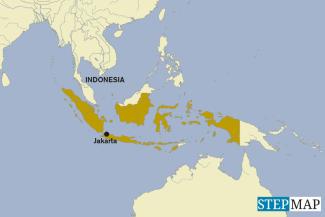Press freedom
Pressure on journalists
 stepmap.de
stepmap.de
The ITE Law was passed in 2008 and amended in 2016. In principle, it is meant to regulate the exchange of information and other electronic transactions. It spells out what is prohibited on the internet. However, its defamation article has been misused to criminalise journalists. It thus has a negative impact on the freedom of the press. Online defamation can be punished with up to four years of prison.
The defamation article prohibits the distribution of electronic information containing insults and/or defamation. However, various parties now accuse online journalists of doing so when they simply do not like coverage, for example, when it deals with corruption and other criminal action. Offended parties argue that the content of the articles is defaming.
Abdul Manan of the Alliance of Independent Journalists, a major journalists’ organisation, sees a trend of journalistic work being criminalised with help of the ITE Law. He is personally affected. As the co-founder of the whistle-blower platform Indonesialeaks, he is facing a defamation trial. The International Federation of Journalists has demanded that the case must be dropped. Manan says that he is confident that his incriminated journalistic work is faultless.
He points out that the situation was always difficult in Indonesia. Physical violence against journalists occurs sometimes, and intimidation is common. In the Press Freedom Index compiled by Reporters Without Borders for 2019, Indonesia ranks 124th among 180 nations.
The defamation clause has an intimidating impact even if no judgement is passed. Last summer, a criminal charge was filed against Zakki Amali, the former editor-in-chief of Serat.id, an independent website in Central Java. The background was that he had published articles about alleged research plagiarism and stated that one of the chancellors of a state university was involved. Civil-society organisations and journalists have protested, but the legal process is still going on and distracting him from journalistic work. “My time is spent defending myself,” Amali says.
Some of the accused are found guilty however. According to the Southeast Asia Freedom of Expression Network (SAFEnet), a civil-society organisation, two journalists were sentenced in the past ten years, and 12 cases are pending. The highest number of cases was filed ahead of the general elections last year, when eight journalists were charged. “The ITE Law has been misused to silence the media,” says Damar Juniarto of SAFEnet.
Indonesia only gained press freedom in 1998 after the downfall of the Suharto dictatorship. The new government passed a liberal press law in 1999. Individual journalists and the media thus enjoy some legal protection. Moreover, the national Press Council was made independent. Its members are journalists, media managers and public leaders. Their job is to settle press-related disputes. Only if they prove unable to do so, can legal action be taken. The ITE Law, however, bypasses the Press Council, so its defamation clause can be misused easily.
Digital media are growing fast. According to the Press Council, there were 43,400 online media outlets in Indonesia in 2016.
Links
Southeast Asia Freedom of Expression Network:
https://safenet.or.id/
International Federation of Journalists:
https://www.ifj.org/media-centre/news/detail/category/press-releases/article/seaju-calls-for-criminal-case-against-journalists-to-be-dropped.html
Ika Ningtyas is a freelance journalist based in Java, Indonesia.
ika_bwi@yahoo.com

